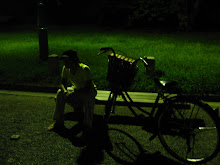Ka Bel Patay! Nahulog sa Bubong! This sort of tabloid headline sums up the entire deal and there’s nothing worthy of a grand scale hullabaloo indeed. But, the whole affair, to my mind, smacks of the very essence of Ka Bel’s unwearied life and politics.
It was Mitch, my partner, who pointed out that the incident actually exemplified Beltan’s life, yes, even to his death. He fell from the roof that he was trying to fix and hit his head on the pavement. Now, how many of us would’ve thought that a government official would actually fix his own roof to effectively shelter the family from the rain? Sure there’s nothing wrong with fixing your own roof whatever position you hold; sure, it is not impossible for anyone, including politicians, to fix anything that needs fixing in their homes. However, if we take the tragedy that has befallen the man as a counterpoint to the usual picture of our beloved politicos as fulsome in their amassed wealth, hidden or otherwise, it becomes clearer how Ka Bel’s life (and unwelcome passing) certainly lays bare the need to reevaluate the ways we make use of our one-shot deal lives. Humility was the word used by Mitch to describe Ka Bel’s seemingly absurdist manner of bidding us farewell. Makikita mo talaga na simpleng tao siya—a way of life certainly not reflected through opulent mansions, superfluous luxury vehicles, fancy hotel accommodations, and inane golf sessions.
Fellow congressman and ally Satur Ocampo shared that Ka Bel didn’t exactly want to take his leave of his family—personal and national—and mission in such manner. He’d rather die engaging in the battlefront of the fight for justice and equality. But, such is life. It’s the caveat that goes with having given a shot at this earth—you relish the unbound possibilities while you breathe, but you also need to embrace the inevitability of meeting the dark angel at the most unexpected and undesired time.
When Ninoy Aquino was killed, it caused quite a stir. It even offered the entire nation a window for converging and taking action to end a despotic reign. But, Ka Bel’s exit wasn’t as, shall we say, dramatic. It sounded incongruous even. Perhaps because we expected him to always be at the forefront of the struggle for a more egalitarian society. Perhaps, because we’ve always pictured him as a survivor persisting with his political convictions even after being detained during the Martial Law days and being locked up once more during this (Arroyo) administration on rebellion charges.
Coincidentally, Hemingway’s novel speaks of death a lot, and of comradeship and of the sacrificing the self for the greater good of the people. Such vivid scenarios of dying that will surely leave the readers teary and hopefully, awakened. Ka Bel’s story didn’t offer us that much sensation when it reached the end, what with all the foregrounding and build-up that the nation had witnessed. Yet, we are forced to think that there has got to be something more than a daft ending to this man’s tale. We are, by a sense of denial or duty, prompted to make more out of an overly simplified and nearly maddeningly ridiculous denouement.
We are almost tempted to accuse death of not honoring the man—of not giving Ka Bel the true, grand and “fairly good” end that he so rightly deserved. Or, maybe the end is pointing us away from itself. And rather than revolving around the man’s death, we are actually urged to examine his life. Better yet, examine his life relative to the ones we are currently holding on to lest we see them fulfilled and fulfilling at this point and at the current state of things in the country and the world.
Ka Bel lived simply and fought the heaviest of battles. He deserved some kind of rest. But we don’t. Not yet at least. There’s still so much to do. The man did his share. The rest has now fallen to our lot. His parting may have been much, much simpler than we could’ve ever imagined, but we should not be blind to the complexities of the struggles that he fought for and entrusted upon us to take on.
“For whom the bell tolls?” ask once more need we,
The bell tolls for those—of us—who refuse to see.
Life is the most precious thing that a person has. Life is something that we get to experience only once. In thinking of the past, one shouldn’t regret the wasted years. In thinking of the present, one shouldn’t be bitter at the pervasive mediocrity. It is enough to be able to say in the end that one’s entire life and strength were devoted to the most glorious enterprise on earth—the struggle to liberate all of mankind.
Nikolai Ostrovsky
"How the Steel was Tempered"
"How the Steel was Tempered"


